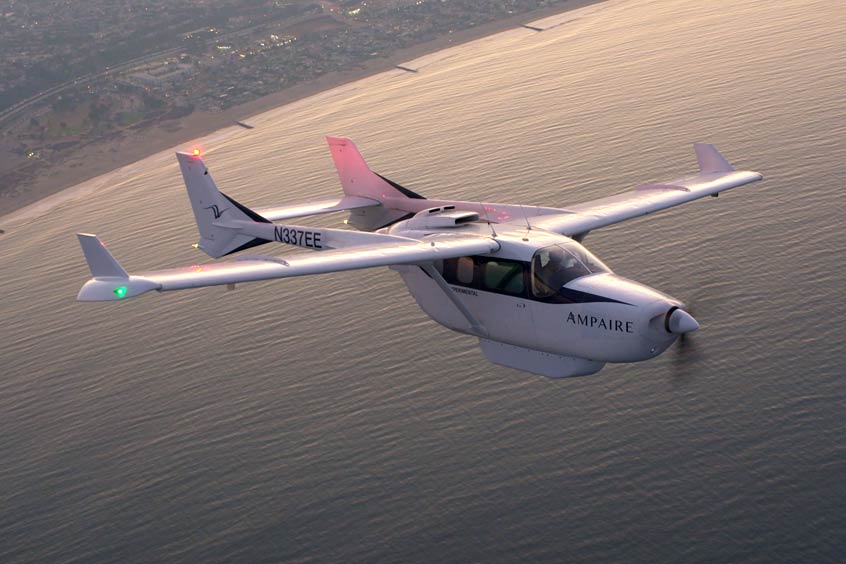ACE 2026 - The home of global charter.
 The bimonthly news publication for aviation professionals.
The bimonthly news publication for aviation professionals.

Ampaire is to head up a consortium to demonstrate the feasibility and advantages of regional electric aviation transport.
The group's 2ZERO (Towards Zero Emissions in Regional Aircraft Operations) programme will include demonstration flights of Ampaire's six-seat Electric EEL aircraft, a Cessna 337 upgraded to hybrid-electric power, and, in a later phase, of a 19-seat Eco Otter SX, hybrid-electric upgrade of the workhorse Twin Otter commuter aircraft. These testbed aircraft will be used to develop and evaluate requirements for a fully integrated electric aviation infrastructure.
Consortium partners include Rolls-Royce Electrical, University of Nottingham, Loganair, Exeter and Devon Airports, Cornwall airport, Heart of the Southwest Local Enterprise Partnership (HotSWLEP) and UK Power Network Services.
The team has received a share of GBP30 million from the Future Flight Challenge for its 2ZERO proposal to demonstrate hybrid-electric aircraft on regional routes in the south west of the UK. The project is funded by UK Research and Innovation (UKRI) through the Industrial Strategy Challenge Fund. The Future Flight Challenge is a £300m programme that will ‘assure the UK’s position in the third aviation revolution’.
2ZERO takes a whole aviation systems approach to integrate hybrid-electric aircraft technology with existing airport and airline operations for rapid adoption of sustainable air travel within a new, net-zero aviation system.
The UK government aims to achieve net zero greenhouse gas emissions by 2050, with electric aviation making a substantial contribution on domestic routes. One of the objectives of the 2ZERO programme is to model and simulate a point-to-point (PTP) route system for regional flights using very efficient hybrid-electric aircraft, improving regional services and providing more time- and energy-efficient travel options versus traditional hub-and-spoke systems.
“For electric aviation to become commonplace and play a significant role in reducing greenhouse gases, we need to look at not only electric aircraft but the entire ecosystem to support electric aviation. That will be a key aim of the 2ZERO programme,” says Susan Ying, Ampaire senior VP for global partnerships.
“We are excited to be involved in Project 2ZERO, which demonstrates our commitment to supporting the decarbonisation of aviation and in reaching net zero carbon by 2050. Working with Ampaire and the other partners is a valuable opportunity for us to deliver a hybrid-electric propulsion system that could help to transform regional air travel in the future,” adds Rob Watson, director of Rolls-Royce Electrical.
“This project provides an opportunity to utilise our research to evaluate the effects of these revolutionary changes to air travel. The inclusion of airline and airport partners will ensure that the models and evaluations are realistic, guiding decision makers into how to best take advantage of these innovations in future,” comments Dr Jason Atkin, Computational Optimisation and Learning Laboratory, University of Nottingham.
The 2ZERO team believes that an effective demonstration of hybrid-electric aircraft in an integrated system, including the necessary charging and energy storage infrastructure, could catalyse a fundamental shift in regional airline operations. Emissions would be reduced by up to 70 percent with hybrid-electric aircraft and entirely with a subsequent generation of all-electric aircraft.
Successful demonstration up to 19 seats and 1 MW of power will help to shape regulations and standards, which currently have gaps for these new classes of aircraft and airport operations. 2ZERO is an important step towards being part of an exciting new market, forecast by UBS to be worth $178 to $192 billion globally between 2028 and 2040.
“With 2ZERO, we are ready to jump start the future of aviation with clean electric power,” Ying continues. The 2ZERO programme runs from December 2020 to May 2022.